If you live on a small farm or homestead, or even if you have a large yard in town, ducks can be an excellent addition to your outdoor setting. Ducks are great egg layers, roast duck is delicious, and your friendly flock will make short work of garden pests. In this article, we review what it takes to keep ducks as pets or livestock and provide information and resources to help you get started. Read on to learn more on how to raise a duck.
What You'll Learn Today
- Which Is Better, Ducks Or Chickens?
- 1. Ducks provide natural pest control!
- 2. Ducks lay big, rich, nutritious eggs
- 3. Roast duck is a luxury
- 4. Ducks are charming
- 5. Ducks are good garden helpers
- 6. Ducks are good lawn helpers, too!
- 7. Ducks turn your kitchen and yard scraps into organic fertilizer
- 8. Ducks are easy to control and manage
- 9. Ducks are tougher than chickens
- 10. Ducks are not cannibals
- How Do You Decide What Kind Of Ducks To Get?
- Birds Of A Feather Flock Together
- How Do You Raise And Take Care Of Ducks?
- Be Sure To Provide Your Ducks With Good Protection
- Ducks Are Very Cost Effective
- Are There Any Downsides To Keeping Ducks?
Which Is Better, Ducks Or Chickens?

If you have to choose, ducks can be a better choice for a homestead than chickens because they are hardier and easier to care for. Furthermore, they lay eggs all year round, but chickens tend to slack off in the winter.
Ducks mature very quickly. Ducklings can grow into meat birds in just a couple of months. Within five months of hatching, young hens begin laying eggs that hatch relatively quickly.
Duck eggs are large, tasty and very nutritious. Some people find them a bit too rich to eat scrambled, fried or boiled, but no one can complain about the fullness they bring to any baked goods. Here are some typical ways how to use them in your kitchen.
Ducks are a valuable addition to any homestead, small farm or large, fenced yard for these reasons:
1. Ducks provide natural pest control!
If you have a flock of ducks roaming your property, they’ll make short work of all sorts of bugs, including ticks, and they’ll nose around in loose soil to locate and gobble up grubs in the garden.
2. Ducks lay big, rich, nutritious eggs
Duck eggs have thicker shells, higher yolks, and greater vitamin and mineral content than chicken eggs. They can’t be beat when it comes to baking. Bread baked with duck eggs has a beautiful golden appearance.
You store duck eggs exactly as you do chicken eggs (here is our selection of cartons), but they stay fresh much longer because of their sturdier shells.
3. Roast duck is a luxury
Duck meat is moist, rich and flavorful. It does have high fat content, but it’s all natural fat, and we need that in moderation.
4. Ducks are charming
They are friendly and personable and fun to watch. They waddle and quack amiably, and they do not crow at dawn!
5. Ducks are good garden helpers
At the end of the growing season, keep your ducks in your garden plot for a few days. They’ll eat up all the leftover vegetation, along with any pest insect eggs that may be lurking on the undersides of leaves. They’ll turn the earth and eat any grubs they may find, and they’ll fertilize the soil with their droppings.
6. Ducks are good lawn helpers, too!
If you let them run loose on your lawn, they’ll eat up weeds and lawn pests and help keep your grass trimmed down so that you don’t have to mow it so often.
7. Ducks turn your kitchen and yard scraps into organic fertilizer
Ducks cannot really be house trained. They are well known for being messy, and there’s a good reason for this. They have absolutely no control over whether or where they poop, but that can be a good thing when you’re talking lawn and garden!
Duck poop is not especially messy out on the open ground, so having ducks add a little fertilizer to the soil where ever they go is not much of a problem. You can also add their soiled bedding from their pen and coop to your compost heap to enrich it.
8. Ducks are easy to control and manage
They are calmer than chickens, far more amiable than geese, and they waddle about more slowly than either of these two types of domestic fowl. If you want to move adult or baby ducks from one place to another, you can just stroll along slowly behind them and direct them with your arms.
9. Ducks are tougher than chickens
Generally speaking, ducks can do quite well in very cold or very hot weather as long as you can provide shelter, shade and fresh water. Different breeds of ducks do better in different climates, but there’s sure to be a breed that suits your climate perfectly.
10. Ducks are not cannibals
Although chickens are well known for pecking each other to death, eating their own eggs and behaving in unpleasant ways, ducks don’t do that. They are generally friendly and amiable to one another, and they do not have peculiar eating habits if you keep them well fed.
How Do You Decide What Kind Of Ducks To Get?

Begin by deciding why you want ducks. Do you want meat, eggs, pets or all three? As with chickens, different breeds of ducks are better suited to different purposes.
For meat production, Muscovies are a good choice. For egg production, Khaki Campbells are well-liked. If you want an all around breed for both meat and egg production, you may want to go with the classic white Pekin.
Do you want ducks to produce just for you, or do you want to make a profit?
Not only are duck eggs bigger, tastier and more nutritious than chicken eggs, you can also sell them for a lot more. If you want to make money with your ducks, having a few more laying hens than you need can be a very cost effective way to go.
Duck meat is also somewhat in demand and can sell for a nice profit considering that your ducks will be healthiest, happiest and fattest if you make sure they get plenty of kitchen, yard and garden scraps and free range bugs along with their regular diet.
Do You Want Pet Ducks?
Luckily, most breeds of ducks are fairly amiable, and if you get them when they are ducklings and handle them a great deal, they will become good outdoor pets. If your main purpose for keeping ducks is having pets, you might as well also enjoy the eggs by choosing an egg laying breed.
Birds Of A Feather Flock Together
Like most fowl, ducks tend to prefer their own kind. If you have a mixed flock, the predominant breed will tend to gang up on the lesser or smaller breeds. This can lead to lack of shelter and lack of food for the ducks not in power. It’s best to decide on a breed and then have your flock made up entirely of that breed.
Different types of ducks have different lawn and garden care skills. For example, if you have a very weedy lawn, you’ll be best off with a flock of Runners or Campbells. All sorts of ducks do well at bug eating, though, and they are preferable to chickens in this regard because you can let them into your garden without having them scratch up the plants and eat your veggies.
How Do You Raise And Take Care Of Ducks?
Although it is possible (though not desirable) to raise chickens in an entirely indoor environment, it really is not possible with ducks. These birds need to be able to go outside to waddle and swim, hunt for bugs and eat greenery. They are omnivorous, and need a wide variety of nutrients for optimum health.
It is especially important to provide vitamin E as deficiencies can cause neurological disorders. Vitamin E in feed mixtures can go stale, so it’s always a good idea to supplement with vitamin E oil or capsules or brewer’s yeast.
In addition to standard feed, ducks enjoy kitchen scraps and yard trimmings. Use common sense, and don’t give them unhealthy kitchen scraps or yard trimmings that may be contaminated with pesticides or insecticides. Likewise, take care not to give them any plants that may be toxic.
Of course, ducks love to swim, but if you are not able to provide a pond or stream, be sure to give them a wading pool or water trough to enjoy.
Additionally, they should always have access to clean drinking water that is deep enough for them to be able to dunk their heads under. They need to do this frequently to keep their nostrils and eyes clean. Failure to provide ample, clean drinking water can result in eye infections.
Be Sure To Provide Your Ducks With Good Protection
Like chickens, ducks need to have a secure place to sleep at night. Otherwise, they are – sitting ducks.
Ducks do not need nest boxes because they like to nest and sleep on the floor of their house. They do need security because they are very susceptible to predators such as:
- Domestic Cats
- Coyotes
- Raccoon
- Bobcats
- Cougars
- Skunks
- Snakes
- Foxes
- Bears
- Dogs
Be sure to make their housing easy for you to access. They tend to track mud and water into their sleeping quarters, so it pays to make it easy to pull out bedding regularly and replace it with fresh. Be sure to compost that soiled bedding.
It’s very easy for raccoons, skunks, foxes, bobcats and other nighttime predators to make off with a sleeping duck, so before you purchase ducks, be sure to set up a secure nighttime shelter for them.
How To Raise Ducks From Tractor Supply
Ducks Are Very Cost Effective
You’ll need to give your ducks a regular diet of non-medicated chicken feed as a base, but a great deal of their diet should be foraged. This means that ducks tend to be less expensive to feed than chickens and produce more benefit because they turn scraps and waste into eggs, meat and fertilizer.
Of course, food is not the only thing ducks need, but their accessories are simple and economical.
If you have a shed or dog house that can close securely, a kiddy pool and a couple of large, shallow pans for feed and drinking water, your ducks will be happy. You should also have a fenced yard so that your ducks don’t wander around the neighborhood or out into the street.
Are There Any Downsides To Keeping Ducks?
If you have too many ducks, they can be noisy, and they can be messy. Ducks do not have a sphincter, so they have absolutely no control over their droppings. This means they leave little messes wherever they go.
As we have said, this isn’t much of a problem on the grass or in the garden, but you should keep your ducks off your porch, sidewalks and patio.
Additionally, this means that you’ll need to change the water in their wading pool and drinking dish frequently as it will become dirty very quickly. Remember that they need clean water to be able to swallow properly and to keep their nostrils and eyes clean.
Ducks may get along with chickens, but they probably will not get along with geese or turkeys, so you might need to take extra steps to keep them separate from other types of fowl.
I don’t really like duck meat, but duck eggs are quite good, and cheap also